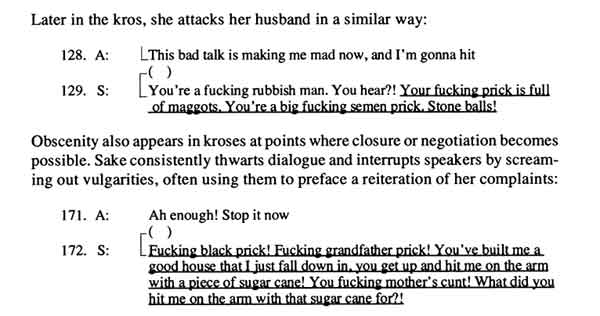October 30, 2007
Taboo avoidance in translation: kros words
Deborah Cameron's new book The Myth of Mars and Venus continues to draw press attention in Britain, the latest coming from a column by Damian Whitworth in the Life & Style section of the Times. And just like Susannah Herbert's Times review three weeks ago (discussed by Mark Liberman in an earlier post), Whitworth opens with an ethnographic vignette from the work of linguistic anthropologist Don Kulick (though Kulick goes unnamed here):
In Gapun, a remote village on the Sepik River in Papua New Guinea, the women take a robust approach to arguing. In her pithy new book The Myth of Mars and Venus, Deborah Cameron reports an anthropologist’s account of a dispute between a husband and wife that ensued after the woman fell through a hole in the rotten floor of their home and she blamed him for shoddy workmanship. He hit her with a piece of sugar cane, an unwise move that led her to threaten to slice him up with a machete and burn the home to the ground.
At this point he deemed it prudent to leave and she launched into a kros — a traditional angry tirade directed at a husband with the intention of it being heard by everyone in the village. The fury can last for up to 45 minutes, during which time the husband is expected to keep quiet. This particular kros went along these lines: “You’re a f****** rubbish man. You hear? Your f****** prick is full of maggots. Stone balls! F****** black prick! F****** grandfather prick! You have built me a good house that I just fall down in, you get up and hit me on the arm with a piece of sugar cane! You f****** mother’s ****!”
In her review of Cameron's book, Herbert presents the obscenities of the quoted kros in a similar expurgated style. A casual reader of the Times might be led to believe that Gapun villagers speak a mixture of English and asterisks.
For the relevant passage Cameron cites Kulick's 1993 article in Cultural Anthropology, "Speaking as a Woman: Structure and Gender in Domestic Arguments in a New Guinea Village" (available via JSTOR), which elaborates on the findings Kulick presented in his book Language Shift and Cultural Reproduction. The tiny village of Gapun where Kulick conducted his fieldwork has a population of about a hundred, and villagers speak both the English-based creole language Tok Pisin and a Papuan vernacular called Taiap. As is typical in Papua New Guinea, Taiap is spoken in Gapun and nowhere else, and the language is increasingly endangered as young villagers abandon the vernacular for Tok Pisin. Older speakers still code-switch between Taiap and Tok Pisin (not English and asterisks).
The kros quoted by Cameron (and bowdlerized by the Times) was spoken by a woman named Sake, who was in her early thirties at the time of Kulick's fieldwork. Kulick describes her as the most dominant woman in Gapun, as she "commands respect and vague feelings of fear from all villagers because of the speed and intensity with which she can hurl long monologues of abuse at anyone she feels has imposed on her in some way." The kros (lit. cross; fit of anger) is the verbal genre in which Sake hurls her vituperation, towards her husband Allan and others in the village.
Here is the unexpurgated translation of the kros in question as given by Kulick in the 1993 article, with regular text representing (translated) Tok Pisin and underlined text representing (translated) Taiap:
Though Kulick doesn't provide a transcript of the original kros in Tok Pisin and Taiap, he does give an indication of how he has chosen to translate Sake's invective in a footnote to the article:
In order to give readers a sense of the tone and emotive force of the words used in a kros, I have avoided literal translations and have instead translated vernacular and Tok Pisin speech into a colloquial form of American English. As for the translation of obscene speech, the word I have rendered as "fucking" in Taiap is the word "bad" (aprɔ) plus an emphatic lexeme (sakar) used only in context of abuse. The anatomical references in the obscenity are fairly literal translations of the originals; thus maya pindukunga aprɔ sakar, which I have glossed as "fucking mother fucker," is literally "mother fuck+NOMINALIZER bad EMPHATIC."
Regardless of the expurgation (and the glossing over of the translation issue), it's unclear why Herbert and Whitworth found the kros so noteworthy as to lead their respective pieces on Cameron's book. For Herbert, it presents an opportunity to muse that Cameron "would give a first-class kros, and enjoy it, too." For Whitworth, it's an opening for some marital humor (and some tweaking of journalistic rules for censoring obscenities):
Such a domestic scene may be familiar to some readers, but for most of us arguing with our partners is not quite such an explosive business; except, perhaps, when discussing who is most responsible for a navigational hiccup on the way to lunch at the home of an old flame of our partner’s, or getting to the bottom of who left the ****** ******* cap off the **** ******* toothpaste for the third ****** ******* time this ****** ******* week.
The six-letter + seven-letter combination of asterisks is easy enough to figure out (though motherfucking is more commonly spelled as a single eleven-letter word without a space or hyphen). But what's the four-letter + seven-letter combination preceding "toothpaste"? I'm guessing Whitworth and his editors missed a couple of asterisks in there, unless it represents a vulgarity so vulgar that it transcends conventional strings of avoidance characters. Sake would be proud.
[Update: Two readers have already suggested that the four + seven asterisk combination could stand for cock-sucking. Kind of a strange way to describe toothpaste...]
Posted by Benjamin Zimmer at October 30, 2007 12:27 AM